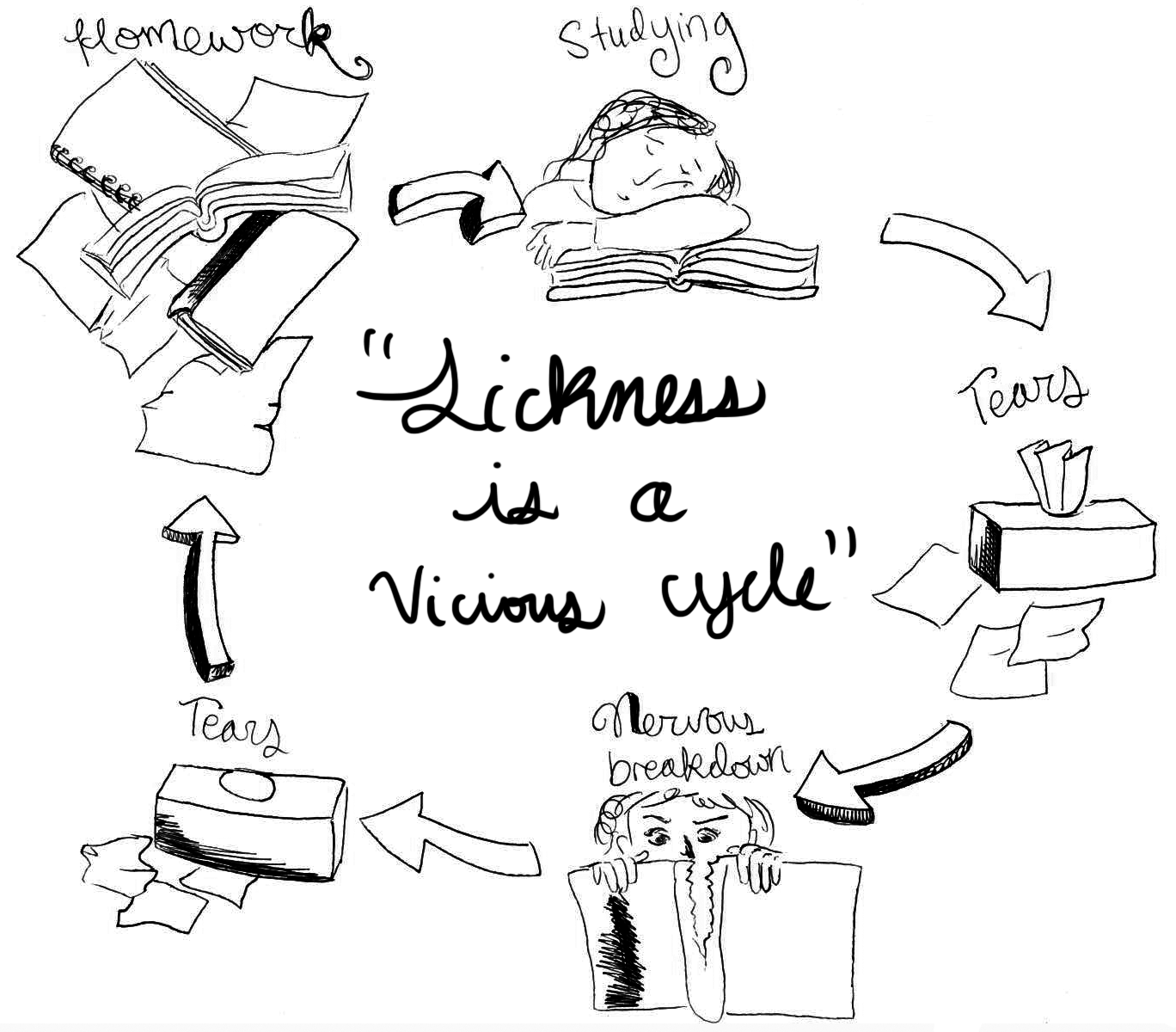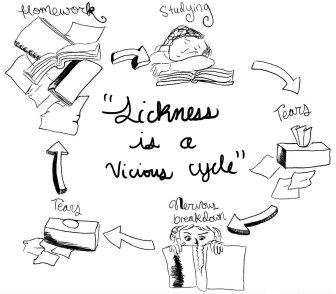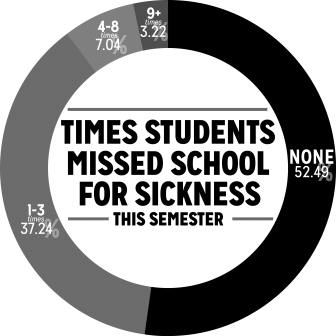
Between a full day of school, water polo practice, yearbook and the Picking for Hunger club, senior Elena Ralls already has a full plate of activities throughout the week. While a couple hours in the evening might be sufficient to finish up homework, Ralls sometimes takes a day off from school to find the time for longer projects.
Ralls says, “Sometimes I take sick days when I need to get college apps done. I took one right before the deadline because I had to get a lot of stuff done, and I feel like you just need a long period of time to get it over with.”

Student “sick” days give students time to take a break from classes or catch up on work. These “sick” days differ from truancies in that “sick” day absences are excused under the pretense that the student is actually sick, whereas truancies are non-excused absences.
However, at what point is taking a “sick” day too much?
Senior Katie Kilcullen says, “If your grade starts dropping, you should be coming to school. Or, if you’re taking a day off on the day of a test or project, especially group projects, that’s not cool.”
Similarly, an anonymous student who replied to a poll taken by the Aragon Outlook says, “I think students should be able to take days off from school, but only in such circumstances when the student is pushed almost to their max capacity.”
Defining the maximum capacity, however, remains difficult as each student’s circumstance differs.
Another anonymous respondent says, “Sometimes you need time for yourself to revitalize/reorganize yourself, but students should only [miss school] if they have a reason—not for being lazy or for procrastinating.”
While students may need a day to catch up for personal reasons, such absences can potentially cause complications for others. For Physics teacher Steve Ratto, tracking sick days from “sick” days can be too much to sort out.
Says Ratto, “As a teacher, you know which kids are sick and which kids are “sick.” But do I want to go through all that trouble of calling a parent out? Is that my job? Is that even the school’s job? Is it worth it? Perhaps for a kid who is consistently out, but we would hope that would show in the kid’s grade.”
Not all “sick” days are created equal. While some students may take a day off to catch up on schoolwork or “take a break,” the Aragon Outlook poll found that 12 percent of student respondents had called in “sick” just to get out of attending school for the day.
Sophomore Glynnis McNamara says, “If the sick day is taken purely out of lack of caring or that they just don’t want to go to school, I’m not sure it’s so justified.”
Senior Katie Goldin adds, “Some people take ‘sick’ days for granted, especially seniors. I think senioritis is a big reason why people decide to miss school.”
“Sick” days don’t only apply to students. Some students have observed teachers taking “sick days” for many of the same reasons students might take a day off: to de-stress and catch up on work.
Junior Nick Jadallah says, “One of my teachers would take off days to grade papers. I think that was okay only because it was just a couple of days in the semester. If it wasn’t school related, though, I don’t think that would be okay. Teachers should be held at a higher standard than students.”

AP English and Guided Studies teacher Jennifer Wei explains her view on the difficulties of “sick” days, “I think that if [the sick day] is a lie, then it’s problematic. I also think that if the system is set up where people feel they have to lie, then its also problematic. That line between individual responsibility and institutional misunderstanding is a tough thing to delineate.”
For students, teacher absences hinder their grasp and comprehension of subjects.
Kilcullen says, “When teachers miss school, it’s hard to learn and understand the material. Sometimes subs can’t answer questions, and I don’t think worksheets really do anything beside provide busywork.”
On the other hand, student absences also restraint on teachers.
“If there are 180 days in a school year, and each kid misses one day, which they usually do, then that become infinitely more time consuming for us as teachers,” says Ratto. “For parents, ‘sick’ days are very localized. They think ‘Oh, my child is just missing one or two days out of the school year.’ Then you go to us teachers and its so much bigger because we deal with so many individual students.”
For some classes, like AP English and Guided studies, attendance is necessary to understand the material.
Wei remarks, “So much of what we do in my classes is generative, meaning the class generates the learning. You can definitely get notes from it, but the cool thing about both classes is that you’re kind of discovering as you’re going, so you miss that, you miss that learning.”
Similarly, a poll respondent says, “I’ve been to school with fevers over 100 [degrees] because I knew that if I missed a day of school it would be very stressful to catch up due to how fast our teachers rush the semester to try to get everything in for the AP test.”
Jadallah adds, “School is stressful and you do all these things to make your college apps look polished. However, I think students also need to learn and apply time management. They can’t take ‘sick’ days every time they need to catch up on an assignment. Students need a balance.”



